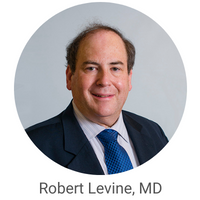NewsFeb | 2 | 2023
Research Spotlight: Research Opportunities in the Treatment of Mitral Valve Prolapse
 Robert Levine, MD, a physician-investigator in the Cardiovascular Research Center at Massachusetts General Hospital, is the senior author of an article in the Journal of the American College of Cardiology, “Research Opportunities in the Treatment of Mitral Valve Prolapse.”
Robert Levine, MD, a physician-investigator in the Cardiovascular Research Center at Massachusetts General Hospital, is the senior author of an article in the Journal of the American College of Cardiology, “Research Opportunities in the Treatment of Mitral Valve Prolapse.”
What Question Were You Investigating?
The article summarizes the findings of an interdisciplinary workshop hosted by the National Heart, Lung and Blood Institute (NHLBI) to discuss the current data on arrhythmic mitral valve prolapse and other aspects of this complex disease of valve and ventricle.
The mission of this workshop was to outline research opportunities to identify patients with mitral valve prolapse (MVP) who are at risk of sudden cardiac arrest and death, understand the mechanism of that complication and develop interventions to prevent it, while improving overall care of patients with this condition
What Was Your Approach?
A two-day virtual workshop was held, during which the authors provided updates from their specific fields of expertise. Presenters included cardiology clinicians and imagers, cardiac surgeons and structural heart disease experts, molecular and developmental biologists, geneticists, and patient advocates.
Much of the discussion was based on the pioneering MGH role in defining mitral valve prolapse, finding its genetic basis as a clue to therapy, and pioneering ways to understand and prevent sudden cardiac death caused by it. Francesca Delling, who chaired the workshop, is also a former MGH Cardiac Ultrasound fellow.
What Were Your Findings?
The authors defined knowledge gaps and research opportunities for the following fields:
- Heart failure in mitral valve prolapse and indications for intervention
- Persistent cardiac remodeling/dysfunction and recurrent mitral regurgitation (MR) following surgical or percutaneous valve interventions
- Sudden cardiac death in MVP – methods of identifying patients at risk
- Genetic studies and developmental basis of MVP
- Mechanisms of myocardial fibrosis and ventricular arrhythmia in experimental and biomechanical models
- Correction of abnormal valvular-myocardial mechanics in MVP to prevent scarring of the heart walls associated with lethal arrhythmias
What’s Next?
This work provides a guide to the authors’ research teams and others towards which aspects of mitral valve prolapse and arrhythmic mitral valve prolapse require urgent attention from the community.
It can lead to critically needed support for our work at MGH, in collaboration with Drs. Serguei Melnitchouk, Thor Sundt and Antonia van Kampen in MGH Cardiac Surgery, Dr. Judy Hung, Director of Cardiac Ultrasound and the Division of Clinical Research, and Dr. Susan Slaugenhaupt, Scientific Director of the MGH Research Institute, to understand heart wall fibrosis and resulting arrhythmias in this valve condition.
Most importantly, this publication will lead to improved treatments of patients with MVP to keep their heart muscle from becoming scarred and to prevent malignant arrhythmias and sudden cardiac death.
Work Cited:
Delling, F. N., Noseworthy, P. A., Adams, D. H., Basso, C., Borger, M., Bouatia-Naji, N., Elmariah, S., Evans, F., Gerstenfeld, E., Hung, J., Le Tourneau, T., Lewis, J., Miller, M. A., Norris, R. A., Padala, M., Perazzolo-Marra, M., Shah, D. J., Weinsaft, J. W., Enriquez-Sarano, M., & Levine, R. A. (2022). Research Opportunities in the Treatment of Mitral Valve Prolapse: JACC Expert Panel. Journal of the American College of Cardiology, 80(24), 2331–2347. https://doi.org/10.1016/j.jacc.2022.09.044
About the Massachusetts General Hospital
Massachusetts General Hospital, founded in 1811, is the original and largest teaching hospital of Harvard Medical School. The Mass General Research Institute conducts the largest hospital-based research program in the nation, with annual research operations of more than $1 billion and comprises more than 9,500 researchers working across more than 30 institutes, centers and departments. In July 2022, Mass General was named #8 in the U.S. News & World Report list of "America’s Best Hospitals." MGH is a founding member of the Mass General Brigham healthcare system.
-
![]()
- Senior physician, Cardiac Ultrasound Laboratory
Type
Centers and Departments
Topics
Check out the Mass General Research Institute blog
Bench Press highlights the groundbreaking research and boundary-pushing scientists working to improve human health and fight disease.
Support Research at Mass General
Your gift helps fund groundbreaking research aimed at understanding, treating and preventing human disease.

